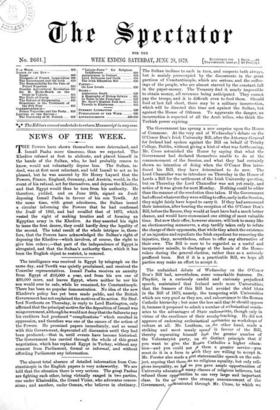The unfinished debate of Wednesday on the O'Conor Don's Bill
had, nevertheless, some remarkable features. Dr. Playfair, in a curiously candid and curiously prejudiced speech, maintained that Ireland needs more Universities; that the framers of this Bill had avoided the chief blots in the Bill of 1873, namely, the tampering with Universities which are very good as they are, and subservience to the Roman Catholic hierarchy ; but none the less said that he should oppose it, because it proposed to admit a number of ,dclesiastical semin- aries to the advantages of State endow/tents, though only in m.ritseaceshinasg.woHrkeshdokipsnooft virtue of the excellence of their secn1
e other hand, made a in favour of the Bill, the greater number of e distinct principle that if n Catholics a higher educa- them a greater service—you ich they are willing to accept it. st statesmanlike speech on the sub- no religious equality, but only reli- as you gave ample opportunities of many classes of religious believers, but 'ties to one very large and important came the strange announcement- of the unieated through Mr. Cross, tO.which we
approve of endowing ecclesiastical s culture at all. Mr. Leatham, on striking and most manly spee thereby separating himself fr the Voluntaryist party, on you want to give the Re tion—and you could not must do it in a form in Mr. Forster also made a ject, arguing that there gious inequality, so 1 University educatio refused those op class. In the e Government, c have referred—that Lord Cairns was to promulgate the tardy offer of the Cabinet on Thursday in the House of Lords, and Sir William Harcourt's trenchant remarks on the extraordinary official indifferenoe which this procedure indicated to a waste of the time of the House. And so the curtain dropped on the heroic efforts of the O'Conor Don, which succeeded only in " drawing " the Government.



































